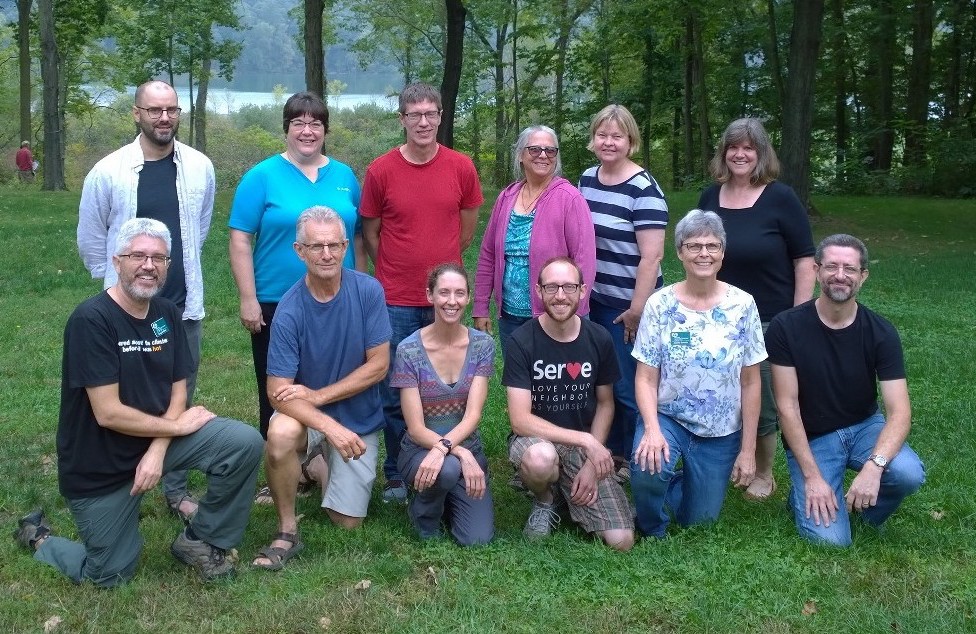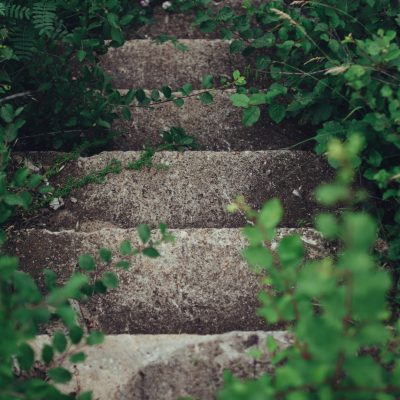
Back row, L to R: Peter Martin, Emmaus Road Mennonite Church, Berne, Ind.; Janeen Bertsche Johnson, Anabaptist Mennonite Biblical Seminary, Elkhart, Ind.; Karl Shelly, Assembly Mennonite Church, Goshen, Ind.; Carol Rose, Shalom Mennonite Fellowship, Tucson, Ariz.; Frances Ringenberg, Prairie Street Mennonite Church, Elkhart, Ind.; Janice Suter, Kern Road Mennonite Church, South Bend, Ind. Front row, L to R: Doug Kaufman, Benton Mennonite Church, Benton, Ind. (retreat leader); Randall Miller, Sunnyside Mennonite Church, Elkhart, Ind.; Amy Huser, Camp Friedenswald sustainability coordinator (retreat leader); Ben Bouwman, Walnut Hill Mennonite Church, Goshen, Ind.; Jennifer Schrock, Mennonite Creation Care Network; Darren Bergstresser, Faith Mennonite Church, Goshen, Ind.
By Carol Rose
I was one of ten pastors who met September 17 to 19 in the green embrace of Camp Friedenswald’s woods for the first in a series of retreats for pastors. We came to explore the intersections of climate change and ministry under the direction of Doug Kaufman and Amy Huser.
Kaufman pastors at Benton Mennonite Church, Benton, Ind., and is the director of pastoral ecology for the Center for Sustainable Climate Solutions, Harrisonburg, Va. This is a new nonprofit partnered with Eastern Mennonite University, Goshen College and Mennonite Central Committee. Huser is the director of sustainability and environmental education at Camp Friedenswald.
Imagine yourself on a free retreat, grateful for the generosity of Ray Martin through the Center for Sustainable Climate Solutions. Imagine a retreat punctuated with the prayers from deep within our heritage: [i]
- “Teach us to reflect on why you have let this new day dawn….”
- “…turn the eyes of our hearts to you so that we too enjoy the blessing of your gifts, partake of them in moderation and use them to your glory.”
Picture yourself receiving deeply grounded scripture reflections that will give fruit through sermons in years to come;
- Job’s creation narrative invites us into wonder and awe and into ongoing dialog with God.
- Rooted in Psalm 104’s vision of people as a part of God’s community of creation, Jesus calls us to notice God’s provision for birds and flowers, for what is needed and for beauty.
- Jesus deconstructs dividing walls and recycles the materials into a doorway (Eph. 2).
Walk with us on planks through the prairie fen where endangered butterflies hibernate. Wander on well-tended paths through tall stands of oak threatened by climate change. Breathe deep the air that is yet clear and free.
Then, delve with us into the perfect moral storm[ii] of climate change caused mostly by lifestyles of the Global North: a climate crisis that threatens our home. Dare to examine the sobering specifics of climate change in your immediate area.
Open your heart to “Who is under our carbon footprint?” Zacarías Arecio Bernabé of El Salvador, Sibonokuhle Ncube of Zimbabwe and Durga Sunchiuri of Nepal[iii] shared how the climate crisis is already wreaking havoc on the most vulnerable. They also described inspiring ways their communities are responding. In a challenge to action, Sister Ncube reminded us, “Noah would say, ‘It’s gonna rain one day.’ One day everyone will see that today’s experience in the South will be the situation in the Global North.”
Dare to look at what is happening, what may happen, what will happen if we and our society do not make small and large changes. Wrestle the despair into hope.
Explore what we can do… and what we will do, while eating kettle-popped corn in a geologic kettle left by the melting of an ice age long past. There are so many ways to reduce our damaging carbon footprints—from installing solar on the sanctuary with the help of a grant through Mennonite Creation Care Network to eating less cheese and more chickpeas, to advocacy with the powers that be.
Most of the U.S. population believes that global warming is important and is real. But very few U.S.ers name it as a priority for political action.[iv] Similarly, this key moral issue of our time is seldom touched on in sermons or addressed by congregational action.
It is not that we don’t care. But we do turn away from feelings of fear, despair, guilt and helplessness. Our distancing strategies create a spiritual numbing that gets in the way of healing lament and effective action. Addressing that malaise is the work of the Church. Week by week, in worship and study and with God’s help, scripture, poetry, images, reframing and re-grounding can melt our frozen hearts.
Turning climate change around will take deep re-rooting in God’s creation and Jesus’ way of servant leadership. (Mt 20:26) Changing the paradigms that have created the human-caused climate crisis is as essential as the scientific and political parts of the puzzle.
- We do not own the earth. The earth is God’s.
- The creatures and plants and land are not “resources” to be exploited, they are relatives created like us by God. (Job 40:15)
- We cannot survive alone. We are in this together.
- We are part of creation and have our part to play.
- God is with us.
The next climate change retreat for pastors will take place November 19 to 21 at Hidden Acres Mennonite Camp, New Hamburg, Ont. Camp Deerpark in Cuddebackville, New York, will host a retreat in 2019 (date TBA).
Register here.
Carol Rose, Tucson, Ariz., pastors at Shalom Mennonite Fellowship.
[i] Based on The Earnest Christian Prayer Book, an English translation of Die ernsthafte Christenpflicht, a devotional that retreat leader Doug Kaufman inherited from Amish ancestors.
[ii] Stephen Gardiner
[iii] This retreat was one stop on the Global South Voices Speaking Tour sponsored by Mennonite Central Committee and the Center for Sustainable Climate Solutions.
[iv] What we Think About When We Try Not to Think About Global Warming, Per Espen Stoknes pp 4-5.
